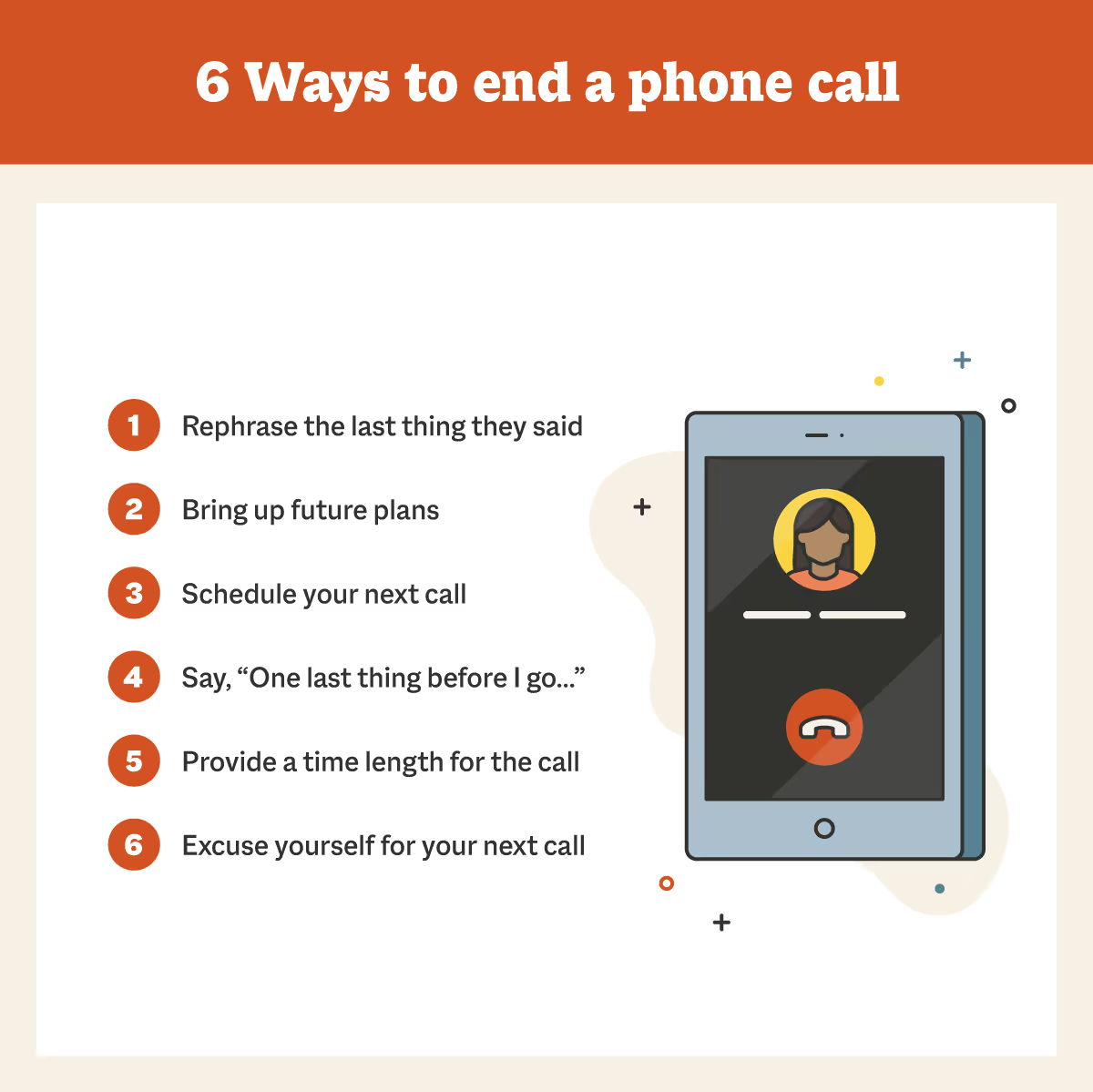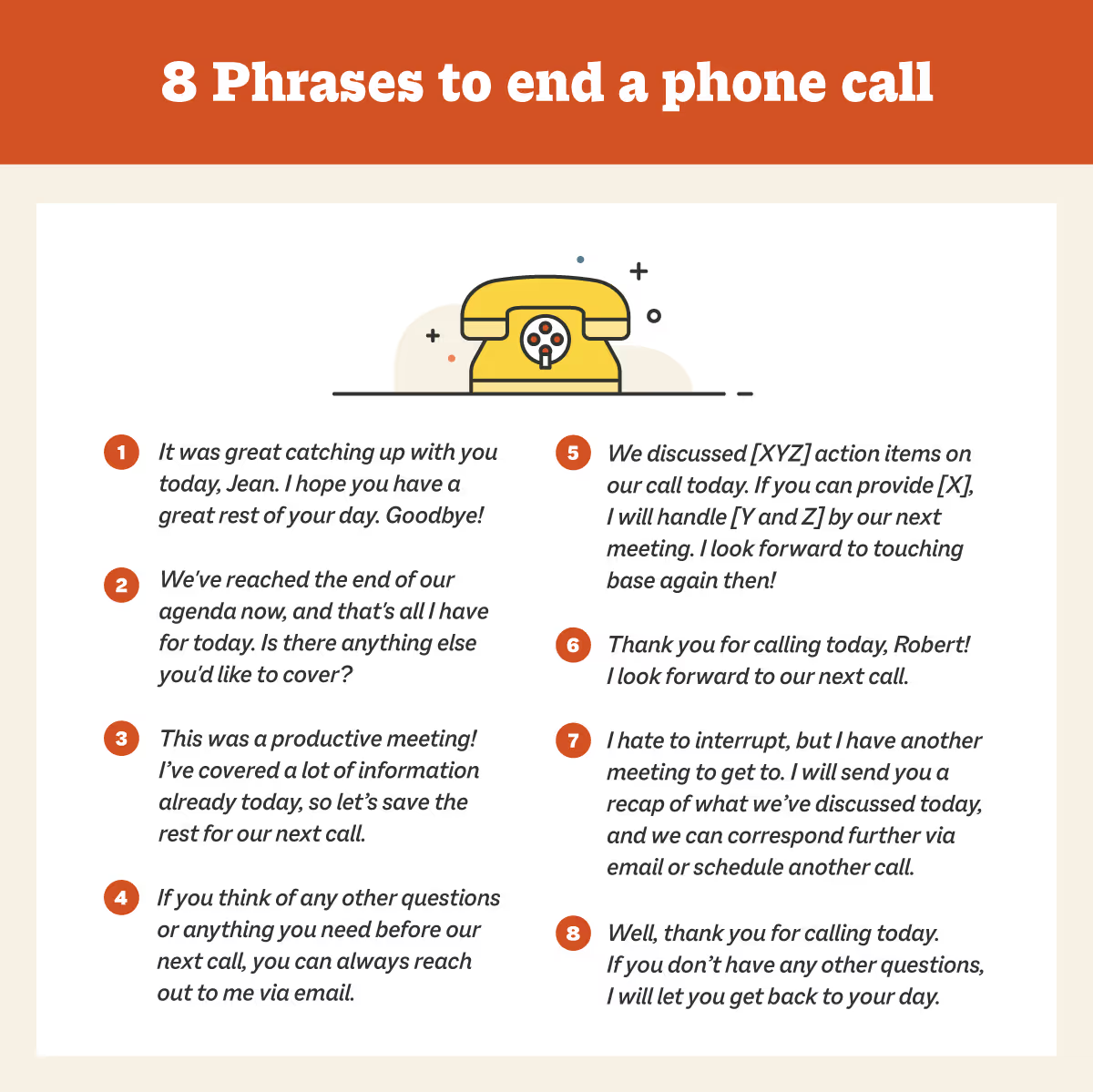How to End a Phone Call + 6 Examples for All Businesses
How to End a Phone Call + 6 Examples for All Businesses

Ninety-two percent of customer interactions occur over a phone call, especially in today's virtual workplace world. How you conduct business over the phone directly affects your company's success.
Appropriate business telephone etiquette says receptionists should answer calls professionally with a proper greeting and not rush callers off the line. But knowing how to end a phone call in a polite, professional way doesn't come naturally to everyone. If you find yourself or your team losing valuable time in your day to calls like these, it may be time to switch to an outsourced team of virtual receptionists.
However, even if you decide to outsource, it's still a good idea to brush up on your phone etiquette skills. Our tips will help guide you on how to end phone calls politely in both a professional setting and on your weekly calls with your chatty aunt.
Why ending a phone call properly matters
The way you end a phone call shapes the caller's final impression of your business. While strong openings capture attention, weak closings undermine everything accomplished during the conversation.
Professional reputation and brand perception
Call endings that feel abrupt or dismissive damage your professional image. Conversely, closings that acknowledge the caller's time and confirm understanding reinforce your business's competence and customer focus. Every call represents your brand, and sloppy endings suggest organizational carelessness.
Clarity on action items and next steps
Calls that end without a clear confirmation of next steps create confusion and missed follow-through. When participants leave uncertain about who handles what tasks or when follow-up occurs, productivity suffers. Proper call endings include explicit agreement on action items, deadlines, and communication plans.
Time management and efficiency
Calls that drift without clear endings waste time for everyone involved. Business professionals lose hours each week to conversations that drag on past their productive conclusion. Learning to recognize natural closing points and execute decisive endings respects both your schedule and the caller's availability.
Customer satisfaction and relationship quality
Callers judge their experience partly on how valued they feel at the end of the conversation. Rushed or impersonal closings leave negative impressions even when the call content was helpful. Taking 30 seconds to close thoughtfully significantly improves satisfaction scores and strengthens business relationships.
Reduced miscommunication and callbacks
Incomplete call endings generate unnecessary follow-up communication. When participants don't confirm mutual understanding before disconnecting, questions arise that require additional calls or emails. Investing time in thorough closings prevents these inefficiencies.
7 tips for ending phone calls professionally
Understanding what makes effective call endings requires focusing specifically on conclusion techniques rather than general phone etiquette. These strategies help you close conversations gracefully while ensuring nothing important gets overlooked.
1. Recognize natural closing opportunities
Skilled communicators identify moments when conversations naturally conclude. These include completing agenda items, answering all questions, reaching decisions, or exhausting relevant discussion points. Watch for verbal cues, such as "I think that covers everything," or topic changes, that signal readiness to close.
Use pauses to your advantage. When interrupting isn't appropriate, natural breaks in conversation provide opportunities to end calls gracefully. These pauses usually occur when topics change, questions are answered, or reconsideration occurs.
Example
"Well, thank you for calling today. If you don't have any other questions, I will let you get back to your day."
2. Summarize key discussion points
Before ending, briefly recap what the conversation covered. This technique confirms mutual understanding, reinforces important information, and provides a natural transition toward closure. Summarizing demonstrates active listening while giving participants the opportunity to correct misunderstandings.
Rephrasing the final key point demonstrates engagement and provides closure. This works across multiple scenarios as an effective ending technique.
Example
"Just to recap our discussion: we've covered the Q4 sales analysis, agreed on the new marketing timeline, and scheduled our next check-in. Does that align with your understanding?"
Or: "Last quarter's sales were lower than the previous quarter. Let me take another look at the report for a deeper analysis, and I'll get back to you with what I find."
3. Confirm action items and responsibilities
Never end business calls without explicitly stating who does what next. Ambiguity about follow-up tasks causes missed deadlines and duplicate effort. Clearly assign responsibilities, set deadlines, and confirm everyone understands their commitments before disconnecting.
Example
"We discussed [XYZ] action items on our call today. If you can provide [X], I will handle [Y and Z] by our next meeting. I look forward to touching base again then!"
4. Express gratitude appropriately
Thank callers for their time while maintaining professionalism appropriate to the relationship. Gratitude acknowledges that everyone's time is valuable and leaves a positive final impression. The specific phrasing should match whether you're speaking with clients, colleagues, or prospects.
Example
"Thank you for calling today, [Name]! I appreciate your time, and I look forward to our next call."
Or: "I appreciate you taking time to discuss this with me today. Have a great rest of your week."
5. Use clear closing phrases
Certain phrases signal unmistakably that conversations are ending. These verbal cues prepare participants for disconnection and prevent awkward uncertainty about whether calls are concluding. Effective closing phrases sound decisive without being abrupt.
Example
"It was great catching up with you today, [Name]."
Or: "One last thing before I go: [final point]..."
Or: "In these last few minutes while I have you, I'd like to mention [topic]..."
6. Handle reluctant-to-end callers tactfully
Some callers continue conversations beyond productive conclusion points. Ending these calls requires polite assertiveness that respects the caller while reclaiming your schedule. Interrupt carefully when necessary, referencing time constraints or upcoming commitments.
Example
"I hate to interrupt, but I have another meeting to get to in a few minutes, and I want to make sure I've answered all of your questions before I go."
Or: "I'm so sorry for the interruption, but our meeting time is about to end shortly, and I want to make sure we've covered everything you need first."
7. Establish future communication plans
While closing current conversations, keep communication channels open for future needs. Specify how and when follow-up will occur, or explain how callers can reach you if questions arise after the call. This prevents calls from feeling dismissive while still achieving closure.
Example
"Thank you so much for your time today, [Name]. If you think of any other questions or anything you need before our next call, you can always reach out to me via email."
Or bring up future plans: "Well, it was great chatting with you today. I hope you have a great time at your [event] this weekend!"
Or schedule next contact: "How does Tuesday the 11th at 3 p.m. work for you?"

6 examples for ending phone calls in common business scenarios
Different types of business calls require tailored closing approaches. The way you end a sales inquiry differs from how you close a customer complaint call or schedule a conversation. These scenario-specific examples demonstrate how to apply ending techniques to real situations your business encounters daily.
1. Customer service or support calls
Customer service calls require a clear close that confirms resolution and leaves customers satisfied with the outcome. Always verify the issue is resolved, provide reference numbers if applicable, and invite future contact if needed.
Example
"I'm glad we could resolve that billing issue for you today, [Name]. Your account is now updated, and you should see the correction within 2-3 business days. Is there anything else I can help you with today? If you have any other questions, feel free to call us anytime. Thank you for your patience, and have a great day!"
2. Appointment scheduling calls
Scheduling calls requires confirmation of the date, time, and any required preparation. Repeat the appointment details clearly and explain how reminders or changes work.
Example
"Perfect! I have you scheduled for Tuesday, March 15th, at 2:00 PM with Dr. Johnson. You'll receive a confirmation email shortly with the office address and parking information. If you need to reschedule, just call us at least 24 hours in advance. We look forward to seeing you then!"
3. Sales inquiry calls
Sales calls should end with clear next steps, whether that's sending information, scheduling a follow-up, or processing an order. Avoid pressure while maintaining momentum toward a decision.
Example
"Thank you for your interest in our services, [Name]. I'll email you the pricing breakdown and case studies we discussed within the next hour. I'll follow up with you on Thursday to answer any questions after you've had time to review. Does that timeline work for you? Great! I look forward to speaking with you then."
4. Complaint or escalation calls
Difficult calls require endings that acknowledge frustration, confirm resolution plans, and restore confidence. Be specific about what happens next and who handles follow-up.
Example
"I sincerely apologize for the inconvenience this has caused you, [Name]. I've escalated this to our operations manager, and you'll receive a direct call from them within 24 hours with a resolution. I'm also sending you a confirmation email with your case number and their direct contact information. Is there anything else I can address for you right now?"
5. Personal emergency interruptions
When emergencies arise during calls, end quickly but professionally. Brief explanations maintain professionalism without oversharing details.
Example
"I apologize, but I have an urgent matter I need to address immediately. Let me schedule a time to continue our conversation when I can give you my full attention. Can I call you back tomorrow morning at 10 AM? Thank you so much for understanding."
6. Subscription cancellation or account closure calls
Cancellation calls should process requests efficiently while leaving the door open to future business. Confirm cancellation details and timing clearly.
Example
"I've processed your cancellation request, and your subscription will remain active until the end of your current billing cycle on April 30th. You won't be charged again. I've sent a confirmation email with these details. We're sorry to see you go, but if your needs change in the future, we'd love to have you back. Is there anything else I can help you with today?"

Improve call handling with Smith.ai
As a busy business owner, you want your clients and potential leads to feel heard, but you don't have the time for extended phone calls, nor do your team members. If you frequently find yourself in situations where calls drag on past their productive conclusion, you may want to consider outsourcing phone call management.
Smith.ai offers 24/7 answering services through both AI Receptionist and Virtual Receptionist solutions. AI Receptionist handles routine calls with structured closings that confirm appointments and next steps, while Virtual Receptionists provide professional call management with human judgment for complex conversations requiring nuanced endings.
Book a consultation today to learn more about how Smith.ai can help manage your inbound business calls professionally from greeting to closing.
Take the faster path to growth. Get Smith.ai today.
Key Areas to Explore

Your submission has been received!














.svg)



